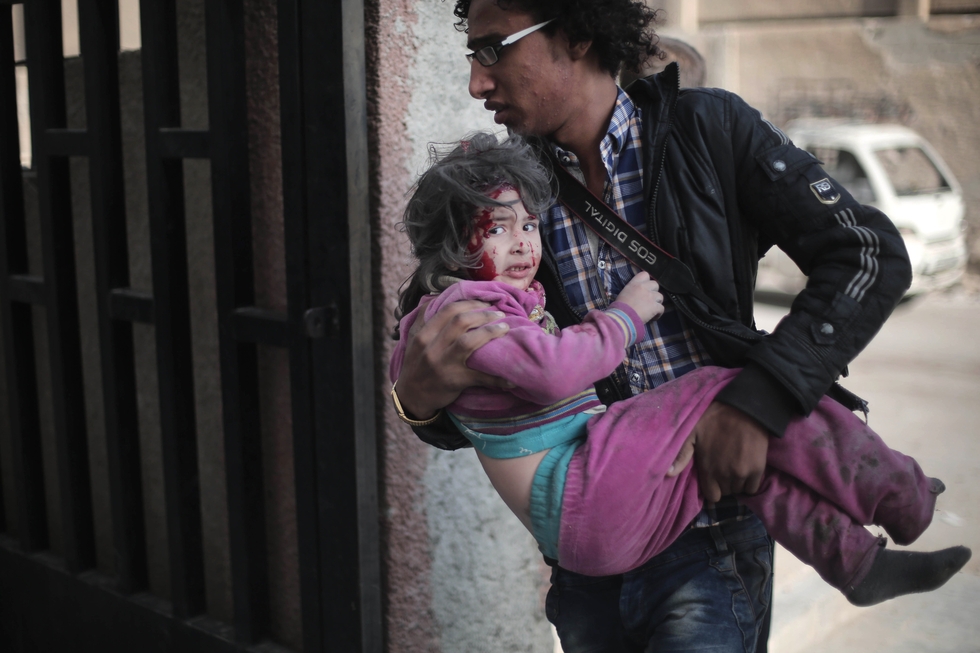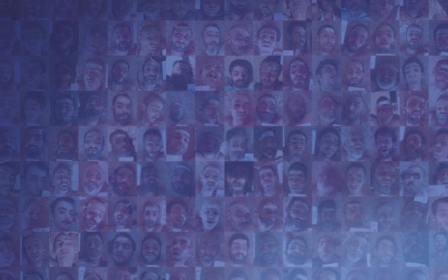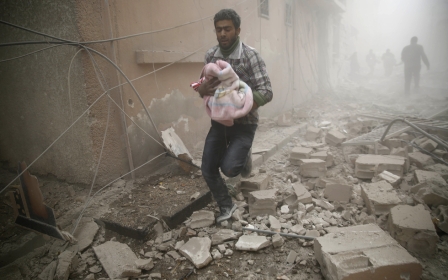Syrian crisis can’t be reduced to a new 'war on terror'

The international community is increasingly losing the sight of the real problem in Syria. It is reducing the matter solely to that of terrorism. One country after another one is joining the burgeoning groups of countries that are supposedly bombing Daesh in Syria. In Syria's congested airspace, there are already 14 countries' jets flying to purportedly degrade and destroy the terrorism.
Following the French lead, both Britain and Germany joined the fray. With this, four out of five United Nations Security Council (UNSC) members and all major European powers are flying over Syrian territory. And almost all of them legitimate their actions on the grounds of fighting terrorism. Before terrorists went after the "far enemy" much more robustly, all the "far enemies" decided to bring the game into the terrorists’ playground.
We are increasingly forgetting why all this mess started in the first place, and subsequently what made Syria the new bastion of global terrorism.
No doubt terrorism is a menace and poses a great danger to decency and humanity. No doubt that it needs to be fought against at all levels; intellectually, militarily, and financially. It is a long battle that will primarily play itself out in the Muslim world. Nevertheless, the new war on terror approach prevailing in the Western capitals is fraught with serious shortcomings and fallacies.
First, it treats terrorism as an isolated problem taking place in a vacuum. No consideration for its political context and social environment is being offered. The mistake is not only confined to the conceptualisation of the issue at hand, it is also related to the prescription to heal this terrorist cancer. Thus far, dropping bombs from the air on the terrorist targets and relying on an imagined community of local forces to do the remaining jobs on the ground is presented as the primary formula. The language of decision-makers and pundits are so laden with the word "terrorism", "Syrian crisis" and "Assad regime" rarely feature in this new dominant narrative on Syria.
This is to some extent a factor of the post-Paris attacks international political environment and psychology. The West is fixated on fighting "terrorists" and "terrorism". The brutal murder of citizens by the Daesh death cult in Paris created a new sense of outrage and urgency. Punishing terrorists has become the defining mood of the political elites in Western capitals. In this respect, Tte Paris attacks have become a new reference point in the war on terror. Though this is understandable, it will be short-sighted of Western decision-makers and pundits if it also becomes a political reference point. This twists our understanding of the Syrian crisis and the means to solve it.
The geometric increase in radicalisation and terrorism in Syria since the start of the crisis in that country clearly shows how terrorism/radicalism has been an outgrowth of the Syrian debacle. Any attempt to solve it that doesn’t take this into account is bound to fail. After all the suffering, forcing Syrians to forget about their brutal oppressors for the sake of fighting the new one is a non-starter. It is crucial to accept that there will be no shortcuts in settling the Syrian crisis, which is essentially a political one, not a security one.
To allow for some comparisons, the Syrian civil war is more complicated than the Lebanese civil war or the post-Yugoslavia wars in the Balkans. In these previous cases, it was clear whom to engage for political negotiations. Conflicting sub-state group identities (religious, ethnic or sectarian) were the dominant representatives. This is sorely lacking in Syria. There are unfolding multi-level crises that we are witnessing in Syria: inter-groups and intra-groups discords.
For instance, Sunni Arabs don't have only one representative. When one engages with a Sunni Arab group in Syria, one should know that they are engaging with only one faction of this identity groups. This should force the international community to go for a more sophisticated solution, not the one that reduces Syria, or for that matter all other oriental societies, to an anthropological issue, for which one can comfortably use a clear-cut ethnic, religious or sectarian taxonomy. Instead, we should use a taxonomy based on some political values. Representative versus authoritarian politics can be such a boundary delineating value. And this division was essentially what the Syrian crisis was primarily about.
With this in mind, neither Assad nor Daesh can be part of the future of Syria. But their social constituency surely will be.
Besides its theological appeal, it is the political context that helps Daesh to turn into a formidable transnational network and a quasi-state. To state it more clearly, Daesh thrives on the political climate provided by a genocidal regime and ensuing state failure. It sustains its revolutionary ideological state, whose boundaries are constantly shifting by providing some level of governance coupled with an appeal to theocratic values. This ideological movement can only be defeated by offering of an alternative narrative and decent level of governance. And none of these can be achieved by consenting to the Assad regime.
The Assad regime is the source of the chaos and state-failure in Syria in the first place. And chaos begets radicalism. Radicalism in return nurtures further chaos. This creates a vicious cycle. Radicalism can only be dealt with once the sources of chaos are duly denoted and dealt with.
If the international community reduces the whole Syrian crisis to that of terrorism and radicalism, and sees the murderous Assad regime as partner in this enterprise of fighting terrorism, this message will echo across the world loud and clear. If a genocidal dictatorship shows sufficient resoluteness in unleashing its war machine on its people, systematically killing hundreds of thousands, displacing millions, and ravaging the whole country, he will then be rewarded with acquiescence for his illegitimate power.
We shouldn’t accept the false choice of either Assad or Daesh. We should reject both. Theocratic apocalypse and secular totalitarianism are strange bedfellows when it comes to their visions for political space and active citizenry. Both have stifling structures for political space and desire completely submissive and subordinated citizenry. This is why we need to have a third way, which is a package deal of concomitantly taking on both the Assad regime and Daesh.
- Galip Dalay works as a research director at al-Sharq Forum and senior associate fellow on Turkey and Kurdish Affairs at the Al Jazeera Centre for Studies.
The views expressed in this article belong to the author and do not necessarily reflect the editorial policy of Middle East Eye.
Photo: A Syrian photographer carries an injured girl following reported air strikes by regime forces on the town of al-Nashabiyah in the eastern Ghouta region, a rebel stronghold east of the capital Damascus, on 14 December, 2015 (AFP).
Middle East Eye propose une couverture et une analyse indépendantes et incomparables du Moyen-Orient, de l’Afrique du Nord et d’autres régions du monde. Pour en savoir plus sur la reprise de ce contenu et les frais qui s’appliquent, veuillez remplir ce formulaire [en anglais]. Pour en savoir plus sur MEE, cliquez ici [en anglais].





